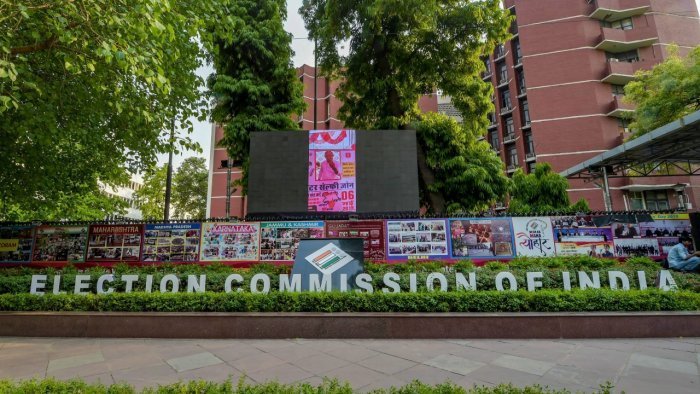
Explained: Why EC wants cap on cash donations to political parties

The Election Commission of India on Tuesday proposed to cap cash donations to political parties and bring down anonymous political donations from Rs 20,000 to Rs 2,000. Chief Election Commissioner Rajiv Kumar, in a letter to the Law Ministry, proposed to cap cash donations at 20 per cent of the total donations received or at Rs 20 crore, whichever is lower.
Kumar also suggested a slew of amendments to the Representation of the People Act (RPA), 1951, which provides guidelines for the conduct of elections in both Houses of Parliament as well as for state legislatures. The proposals are aimed at ushering in reforms and transparency in donations received by political parties, and also the expenditure incurred by candidates trying their luck at the hustings.
What triggered EC’s proposal?
The move comes in the backdrop of the poll panel recently delisting 284 defaulting and non-compliant registered unrecognised political parties (RUPPs), declaring more than 253 of them inactive. The Income-tax department recently raided a number of such entities across the country on charges of tax evasion after the EC shared its report with its administrative authority, Central Board of Direct Taxes (CBDT).
Why does the ECI want to limit cash donations to parties?
The key reason for the EC’s proposal is to check the flow of black money into the election process and bring transparency to political funding. According to a report from the Association for Democratic Reforms (ADR), over 36 per cent of the funds received by national and regional parties in FY21 were from “unknown” sources. The ADR report, based on the analysis of political parties’ income tax returns and donation statements filed with the EC, said that between FY05 and FY21, the national parties had collected Rs 15,077.97 crore from unknown sources.
Also read: Explained: How street furniture will be roped in to stream 5G to you
“For FY21, eight national political parties declared Rs 426.74 crore income from unknown sources and 27 regional parties received Rs 263.928 crore income from unknown sources,” the report said. “During FY21, the Congress declared Rs 178.782 crore as income from unknown sources, which is 41.89 per cent of the total income of national parties from unknown sources (Rs 426.742 crore),” the report said. The BJP declared Rs 100.502 crore as income from unknown sources, which is 23.55 per cent of the total income of national parties from unknown sources. The unknown sources include ‘donations via Electoral Bonds’, ‘sale of coupons’, ‘relief fund’, miscellaneous income’, ‘voluntary contributions’, and ‘contributions from meetings/morchas’. The details of voluntary contributions from such donors are not available in the public domain.
What about foreign donations?
Another area of concern that has been identified by the EC is the violation of foreign exchange regulations. The EC wants every candidate to open a separate bank account for election purposes, route all expenses and receipts through this account, and furnish these details in their account of election expenditure.
The EC has also sought “electoral reforms” to ensure that no foreign donations creep into the funds of the parties as stipulated under the RP Act and the Foreign Contribution Regulation Act (FCRA), 2010. At present, there is no mechanism to segregate foreign donations at the initial stages specifically, and the present format of contribution report is “not equipped” to seek additional information. The Commission, therefore, has sought for a broad discussion on the subject between different stakeholder ministries to come up with a mechanism to identify and deter prohibited foreign donations.
What do the current rules say?
At present, political parties are not required to reveal the names of individuals or organisations who donate less than Rs 20,000 or those who donate via Electoral Bonds. As per Section 29C of the RPA, political parties are required to give the EC details (such as name, address, PAN number, mode of payment and date of donation) of donors contributing Rs 20,000 and above. This is called the Contribution Report and the treasurer of a political party or any other authorised person shall prepare the report on the party’s behalf each financial year.
According to the rules, the Contribution Report has to be made available with the EC annually as prescribed under Section 29C of the RPA in Form 24A. If the parties do not submit an annual report of donations received above Rs 20,000, they would not be eligible for tax relief under Section 29C of the RPA. Is there a limit on contributions? According to Section 293A of the Companies Act, company donations should not exceed 5 per cent of its average net profit over the past three years. However, there is no restriction on the number of times that contributions can be made by individuals or companies/trusts.
How will this affect political parties?
If the Centre accepts the proposal, political parties will have to provide to the EC the names and details of all donors contributing more than Rs 2,000. Several activists and experts, however, had earlier flagged that this action would be ineffective as parties would resort to multiple receipts/coupons of Rs 1,999 each as they do to evade disclosure under the Rs 20,000 limit on cash donations by issuing multiple receipts of Rs 19,999 each.
It would also mean that the total contributions from unknown sources to a political party would be limited to Rs 20 crore or 20 per cent of the party’s total donations, whichever is lower. The amendment would affect parties such as Mayawati’s Bahujan Samajwadi Party, which said that it had never received funds from voluntary contributions (above Rs 20,000), the sale of coupons, Electoral Bonds or other unknown sources of income.

